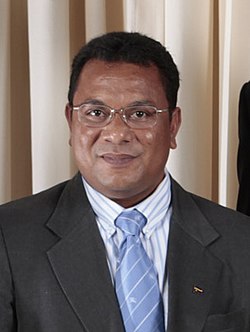| |||||
| Decades: | |||||
|---|---|---|---|---|---|
| See also: | |||||
The following lists events that happened during 2022 in the Republic of Nauru .
| |||||
| Decades: | |||||
|---|---|---|---|---|---|
| See also: | |||||
The following lists events that happened during 2022 in the Republic of Nauru .
| Image | Name | Position | Term |
|---|---|---|---|
 | Lionel Aingimea | President | 27 August 2019 – 28 September 2022 |
 | Russ Kun | 28 September 2022–Incumbent | |
 | Martin Hunt | Deputy | 27 September 2022–Incumbent |
 | Marcus Stephen | Speaker of the Parliament | 27 August 2019–Incumbent |

Ongoing – COVID-19 pandemic in Nauru